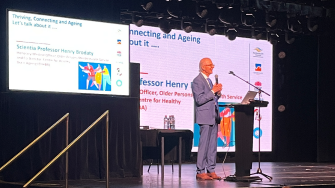Thriving, Connecting and Ageing
Blog: The Brain Dialogues
Blog: The Brain Dialogues

Close to 500 people filled the auditorium of the Souths Juniors on Wednesday for the annual Eastern Suburbs Older Persons’ Mental Health Services forum, with a goal of changing the narrative on ageing. This year’s highly anticipated event aimed to provide expert strategies to reduce psychological distress and memory disorders as we age.
The official opening of the Thriving, Connecting and Ageing forum was made by Dr Gregory Levenston, Board Director of the South-Eastern Sydney Local Health District (SESLHD), who said that the forum has a proud history of making people’s lives better.
With demand for health services continuing to grow, so is the demand for connected care. Patients need the option to be more involved in the decisions of their care.
SESLHD General Manager of Mental Health Services, Christopher Hay, encouraged the audience to always ask questions of their practitioners and to seek clarification at every moment.
The free event, held in partnership with the Randwick City Council and the Centre for Healthy Brain Ageing (CHeBA), continued its track record of providing practical strategies for older people. It featured several expert speakers including Dr Lindsay Wu, a Senior Research Fellow at UNSW, who shared his knowledge of molecular biology and its role in healthy living.
Dr Wu spoke about the impact of COVID-19 on the older population, in particular the widespread complications caused by social isolation. His presentation also touched on one of the major issues that he believes older people face, which is polypharmacy – the prescribing too many different drugs – with his recommendation of visiting the local pharmacist for a review. Dr Wu emphasised the importance of resistance or strength training.
The single most important thing you can do is to maintain muscle mass. Resistance training can have a profound impact on your quality of life.
Attendees were then fortunate to hear from Macquarie University’s Professor of Clinical Psychology Viviana Wuthrich, a pioneer in virtual treatments, who discussed three key strategies in maintaining good mental health in later life: balancing activities (doing things that give you pleasure while exercising and socialising regularly), solving problems (finding ways to improve your situation and life) and keeping things in perspective (maintaining a positive attitude and drawing on your own wisdom to handle challenges).
As part of proceedings, a conversation was had between Robina Beard, who - at the age of 86 and after a hip replacement - teaches dance and movement classes at Coast Centre in Little Bay, and Georgie Davis. The pair enthusiastically encouraged attendees to find a reason to get up in the morning, highlighting how activities like going to a class, painting, playing bridge or learning an instrument give us purpose and help us overcome physical challenges and mental difficulties.
At Coast Centre there is music, learning, talking and importantly, there’s laughter.
The final two speakers of the day were Author and Clinical Psychologist Melissa Levi and Scientia Professor Henry Brodaty AO, Honorary Medical Officer of the Older Persons’ Mental Health Service, Prince of Wales Hospital and Co-Director of the Centre for Healthy Brain Ageing (CHeBA).
Ms Levi gave support to carers and explained that “caring feels hard, because it is hard.”
She encouraged people to set up a village involving family, friends, close neighbours and government assistance, to help share caregiving responsibilities.
“Carers often end up burnt out because they do not have the right resources in place,” said Ms Levi. “It’s vital to look after yourself too while you are providing care to others.”
Audience favourite Professor Henry Brodaty covered the significance of social health, noting it as important as physical health.
People with more social support have greater cognitive resilience.
“And one of the best predictors of health is having someone to confide in.”
Incredibly, 50% of people over the age of 60 are at risk of social isolation, with a third experiencing loneliness later in life. This potential increases for people over the age of 75 and for people living in aged care facilities.
“With social isolation accounting for 5% of the population-attributable risk of dementia, it is extremely important to establish and maintain good social connections,” said Professor Brodaty.
All presentations from the Forum can be accessed at: https://www.seslhd.health.nsw.gov.au/services-clinics/directory/older-persons-mental-health-service/older-persons-mental-health-services-annual-positive-ageing-forums
Ms Levi shared free resources and webinars available at: www.talkingageing.com.